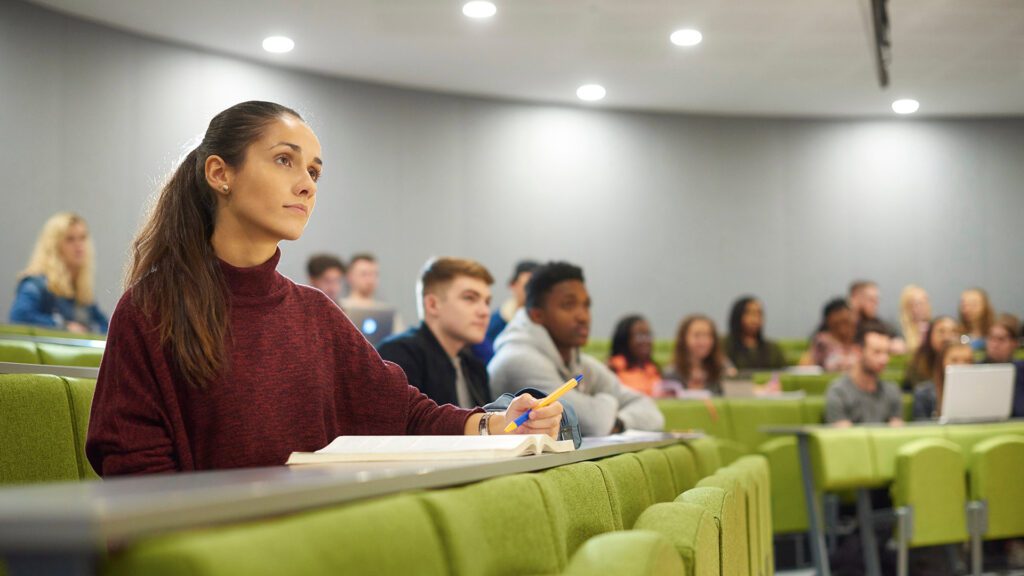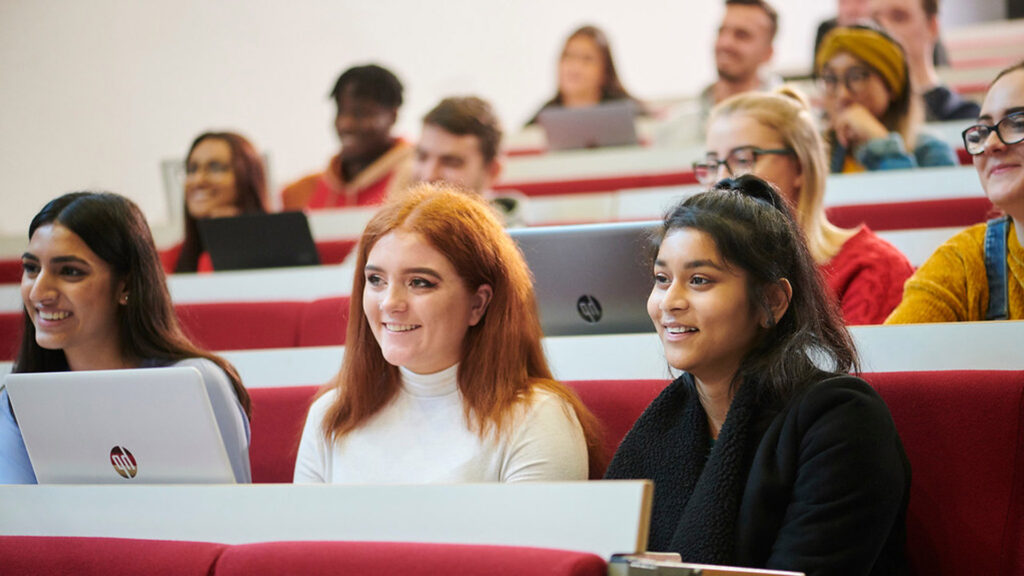Education BA (Hons)
UCAS code: XX10
Experience learning in action. Embark on a journey that explores how UK education has evolved. Studying for an education degree with us, you’ll look at the entire system, from early years to advanced study at degree level.
Overview
| Course length: | 3 years full-time |
|---|---|
| Start dates: | September 2025 September 2026 |
| Location: | Edge Hill University (full-time) |
| Example offers: | BCC-BBC (A Level) or DMM (BTEC) View full entry criteria |
| Subject(s): | Education and Teaching |
| Faculty: | Education |
| Department: | Secondary and Further Education |

Intrigued about how our school systems came to be? Ever wonder how past governments have shaped teaching? We’ve designed this degree to explore education – an engine for social justice, tackling inequality and championing diversity. You’ll find the answers through the prisms of history, sociology, philosophy and psychology.
Joining us you’ll spend time looking at the UK education system, then see how it relates to the rest of Europe and the entire world. You’ll also explore the ideas at the forefront of education policy and practice. Plus, you’ll look back to see how they’ve shaped the way we teach and learn in the 21st Century.
Experience the world of education
Helping you put your learning into context is a top priority for us. That’s why we organise regular visits to different places where education takes place. We’ll also give you the chance to do a placement in Year 2 . It’s up to you whether this is in a traditional classroom or another space where people learn like an art gallery or museum.
Armed with an education degree, you’ll be ready for further training. This could be a PGCE to become a teacher or a Master’s in a related area.
Course features
-
International students can apply
-
Work placement opportunity
What you'll study
In Year 1 of your education degree, you’ll explore the different areas of study within education. By applying key concepts to real-world scenarios, we’ll introduce you to the core disciplines of education studies – history, sociology, philosophy and psychology. You’ll look at the use of technology in education and how it can make learning more engaging. And we’ll cover different barriers to education, such as class and disability, and how inclusive teaching can overcome these.
Year 2 focuses on teaching you to design and carry out research projects. We’ll give you the chance to explore the work of key thinkers in the field and explore education from a psychological perspective. At the same time, you’ll examine changes in UK education and compare the UK education systems with others around the world. It’s up to you whether you do a placement or complete an extended study about an aspect of education.
You’ll design and carry out your own research project or dissertation in Year 3. Through seminar discussions, you’ll also continue to explore the history, sociology, philosophy and psychology of education. Become confident applying your knowledge to UK and international education contexts, comparing and critiquing the way education takes place. We’ll help you compare your knowledge across different disciplines. You’ll explore the burning question: how can education be improved in the future?
How you'll study
You will study in a variety of ways, such as lectures, seminars and workshops. You will be taught and guided by experienced staff who will get to know you, both as an individual and as part of a group, so that you can acquire the skills and experience you need in order to move successfully into the world of employment. You will also take part in visits to different settings in which education takes place.
In Year 2 you will have the opportunity to undertake a work placement and engage in work-based learning. Placements will be in a variety of different settings in which education takes place, either formally (schools) or informally (for example, art galleries and museums), and will be closely matched to your career aspirations.
How you'll be assessed
The programme enables students to produce work for assessment in a range of different ways. From more traditional essays and class tests, through group work and presentations, to the creation of websites, wikis, videos and blogs, the assessment strategies on this programme equip students with a host of communication skills that will serve them well in their future careers.
There are no formal written examinations as part of the current assessment methods on this programme.
Who will be teaching you
You will be taught by a team of lecturers who bring with them a vast amount of both professional and academic experience. Members of the team include academics who research both the theoretical and practical aspects of teaching and learning in a host of contexts. Other members of the programme team offer a wealth of experience in teaching across all age-phases and a wide range of academic disciplines.
Where your course includes optional modules, these are to provide an element of choice within the course curriculum. The availability of optional modules may vary from year to year and will be subject to minimum student numbers being achieved. This means that the availability of specific optional modules cannot be guaranteed. Optional module selection may also be affected by timetabling requirements. Some restrictions on optional module choice or combinations of optional modules may apply.
Entry criteria
Typical offer 104-112 UCAS Tariff points. No specific subjects are required.
Two GCSES at Grade C or Grade 4 or above (including English).
Example offers
| Qualification | Requirement |
|---|---|
| A Level | BCC-BBC. |
| BTEC Extended Diploma (or combination of BTEC QCF qualifications) | Distinction, Merit, Merit (DMM). |
| T Level | Overall grade of Merit. |
| International Baccalaureate (IB) | We are happy to accept IB qualifications which achieve the required number of UCAS Tariff points. |
| Access to Higher Education Diploma | 45 credits at Level 3, for example 9 credits at Distinction and 36 credits at Merit or 15 credits at Distinction and 30 credits at Merit. The required total can be attained from various credit combinations. |
Please note, the above examples may differ from actual offers made. A combination of A Level and BTEC awards may also be accepted.
If you have a minimum of two A Levels (or equivalent), there is no maximum number of qualifications that we will accept UCAS points from. This includes additional qualifications such as Extended Project Qualification (EPQ), AS Levels that haven't been continued to A Level, and General Studies AS or A Level awards.
English language requirements
International students require IELTS 6.0, with a score no lower than 5.5 in each individual component, or an equivalent English language qualification.
If your current level of English is half a band, one band, or one-and-a-half bands lower, either overall or in one or two elements, you may want to consider our Pre-Sessional English course.
Fair Entry Criteria
Our new Fair Entry Criteria is a Contextual Admissions Policy that takes an applicant’s personal and educational background into account. This policy will allow eligible applicants to receive up to a two-grade reduction in their entry requirements for this course. Find out more and see if you qualify.
How to apply
Apply full-time
Read our guide to applying through UCAS to find out more about the application process.
International
Please see our international student pages for further information about how to apply as a prospective international student.
Should you accept an offer of a place to study with us and formally enrol as a student, you will be subject to the provisions of the regulations, rules, codes, conditions and policies which apply to our students. These are available at www.edgehill.ac.uk/studentterms.
If you join a full time undergraduate degree at Edge Hill University, we will guarantee you the offer of a room in our halls of residence for the first year of your course.
Discover our accommodation
Facilities

The Faculty of Education enjoys the enviable position of being one of the country’s leading providers of transformative education, training and research for the teaching and education workforce. Housed in a state-of-the-art £9m building, the Faculty of Education enjoys a stunning setting from both its lakeside and piazza buildings.
Facilities in the lakeside building include a 300-seat lecture theatre, five well-equipped ICT suites, and 18 teaching rooms complete with the latest technology.
Our nearby piazza building houses our Research Hub and our Secondary and Further Education department including a lecture theatre and a number of seminar rooms.
Where you'll study
Finance
Tuition fees
UK Full-Time
£9,535
a year
International
£17,000
a year
EU/EEA and Swiss students who have settled or pre-settled status under the EU Settlement Scheme, as well as Irish nationals, may be eligible for the UK tuition fee rate.
Financial support
Subject to eligibility, UK students joining this course can apply for a Tuition Fee Loan from the Government to cover the full cost of tuition fees. UK students enrolling on the course may also be eligible to apply for additional funding to help with living costs.
Scholarships
We offer a range of scholarships, which celebrate the determination, commitment and achievement of our students. Many of our scholarships are awarded automatically. There are some however, where you will need to be involved in an application or nomination process. To find out more about our scholarships and check your eligibility, please visit our dedicated scholarships pages.
Money Matters
Please view the relevant Money Matters guide for comprehensive information about the financial support available to eligible UK students.
EU/EEA and Swiss students who have settled or pre-settled status under the EU Settlement Scheme may be eligible to apply for financial support. Irish nationals can ordinarily apply to Student Universal Support Ireland (SUSI). If you are an EU student who does not have settled or pre-settled status, or are an international student from a non-EU country, please see our international student finance pages.
Your future career
We’ve designed this course for people with an interest in education. Perhaps you want to discover what role in the field would be right for you. Or maybe you haven’t decided which age range you want to work with yet.
After looking at education from different angles, you’ll understand this area inside out. Whatever you decide to do next, you’ll have a foundation of skills that will set you up for a variety of careers in education, not just roles in schools. You might design training for the corporate world, educate visitors in zoos or encourage learning in museums.
After graduating, many students use their degree as a launchpad for further training. Popular career paths include:
- teaching at early years foundation stage, primary, secondary or further education through postgraduate teacher training
- psychology and mental health
- mental health practitioner
- educational psychologist
- learning mentor
- education administrator
- education counsellor
- social/community worker
- prison educator
- international development worker
- training organiser
Personal tutor sessions will focus on reviewing your progress towards graduate level employment, with leadership skills built into every module so that you feel confident leading teams, working in groups and managing projects. Dedicated employability sessions in each year of study will guide you in writing a CV, producing a professional LinkedIn profile, and compiling an electronic portfolio that evidences your graduate skills.
Course changes
Every effort has been made to ensure the accuracy of this information, however our courses are subject to ongoing review and development. Changing circumstances may necessitate alteration to, or the cancellation of, courses.
Changes may be necessary to comply with the requirements of professional bodies, revisions to subject benchmarks statements, to keep courses updated and contemporary, or as a result of student feedback. We reserve the right to make variations if we consider such action to be necessary or in the best interests of students.












